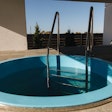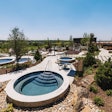
First of all, tell us a little about the experience you bring to SPEC.
I've spent over 30 years in government affairs and the lobbying business. Norwood & Associates started in 1977. It's been through a couple of generations, but since that point we've been involved in representing clients before the California legislature and regulatory agencies, and of course, the governor's office. We have about 20 clients right now - organizations like Pacific Life, First American Title Insurance, Independent Insurance Agents, Comcast cable, Churchill Downs, Liberty Mutual. So it's a broad range of business clients that changes from time to time, but for the most part we've represented clients for a long time.
SPEC is one of the newest additions to our client list. It's a bit different, only because, as opposed to a traditional association, it's really more of a coalition of interests, all tied to the spa and pool industry in California. It represents pool builders, manufacturers of pool equipment, subcontractors, the service industry, distributors, the chemical industry, etc. So it's a real range of businesses with the common interest of spas and pools. Don worked for years representing this group, and we think it's an exciting client with a lot of challenges.
What are some of the issues coming down the pike that'll affect the hot tub industry?
A couple of issues that are on our plate right now are the California implementation of Virginia Graeme Baker, which has already passed both houses and is off to the governor. We engaged on that early on, and we've got that well in hand. There's also legislation sponsored by the State Contractors Licensing Board to increase fines to unlicensed contractors, which, if it's not already on its way to the governor, it will be shortly, and we've been involved in that. Other than that, we're looking at general employer issues that affect everybody - things like wages, hours, working conditions, workers' compensation. Those kinds of issues have an affect on all businesses.
In the pool and spa industry, there's been a perception that as California goes, so eventually will go the rest of the nation. Is that accurate?
There's just no question. California's legislature is most like the U.S. Congress. It's in session from nine to 10 months a year and they look at in the neighborhood of 5,000 to 6,000 bills every legislative session, and on those bills there's no limit to the number of times they can be amended. So, you have a tremendous pool of potential issues that could come at you, ranging from safety issues, barrier issues, energy and water conservation, unlicensed contractors, chemical issues, motor vehicle issues, just go down the line. California does set the trends across the nation, so almost every industry looks to engage on issues here first and stop them.
I think that's one of the top priorities of our work - to increase awareness of that across the country, then potentially build more membership support among companies and manufacturers that aren't located in California but are doing business here. Take any type of business or trade association, and there's probably 10 percent of that affected industry that actually belongs to a trade association and pays dues to protect and defend that industry. So a lot of people get a free ride in many respects on the efforts of those few. That particularly is true of people who are out of state. But if you're doing business in California, the California legislature is your unwanted business partner.
Can you talk about Don Burns' last weeks and months and any help he may have given you getting up to speed?
Don moved into our offices a year ago in July and we spent a year working with him on what issues to track and learning how he worked with the contractors licensing board and local building officials, etc. It was getting the process down first, and getting introduced to the issues. There's also the ongoing project of organizing, in our own way, about 30 years of Don's files on a subject-matter basis. There's never enough time in the day to get all of that organized.
Can you explain a little about the mechanics of lobbying?
I think there are a lot of people who've heard the word "lobbyist" and have a misimpression of what we do. Certainly we spend a lot of time in the capitol, and that's where the term developed. But our job is to act as the industry's lawyer. First of all, we have to get the background on an issue, develop information, figure out exactly what our position is, whether we need an amendment or whether we need to kill the bill or alter it. We need to encapsulate that in a position paper or a background paper or whatever the case may be. Then, if it's a bill that someone else has introduced, we go to that author, tell them what we think the problem is, and what would resolve our client's concerns. In addition, each bill has to be heard in at least four committees in the legislature, and every bill has to go to a policy committee. So what we do is go to that policy committee, where there'll be a majority and a minority consultant, and we'll endeavor to educate those consultants as to the facts of the situation, what our concerns are and why our concerns deserve to be considered in the debate, because each of those consultants is going to write an analysis on the bill, and their members pay attention to those analyses. We'll then try to get appointments with every member of that policy committee. We're going to meet with the staff of every committee member to inform them of those same issues.
We have pool professionals in each of their districts that can go to these district offices. There's also a press component, so getting some attention there can certainly help. And so, basically, our job is to get enough votes on one committee or the other to change that bill; to get that bill amended to deal with our concerns, or to get enough votes to kill that bill if it doesn't.
Comments or thoughts on this article? Please e-mail [email protected].










































